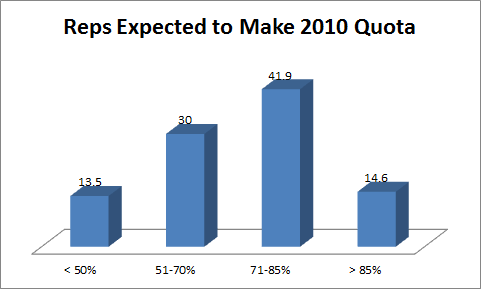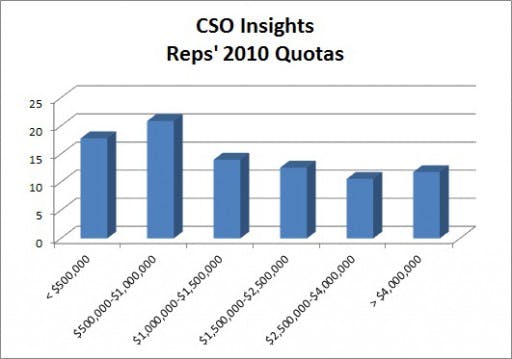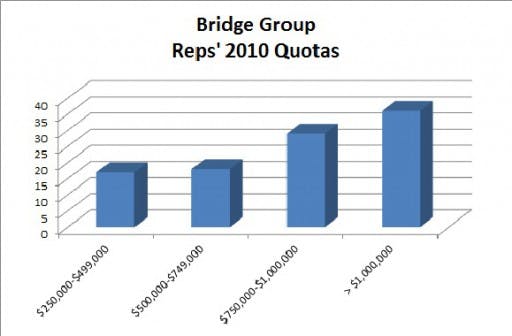The Cost of Missing Quota
Matthew Bellows
The quotas that sales reps must meet have risen 33% in four years, and the number of people meeting their quotas has fallen 25% according to The Bridge Group. While it’s tempting to blame bad sales quota policies, this steady trend is more likely the result of conscious efforts to reduce net overall pay to salespeople. According to The Bridge Group, the average base salary for a sales rep in 2010 was $53,000, and the average total compensation was $98,000. The incentive-based earnings for the average rep was $45,000; 44% of total compensation.
Hitting Quota
The Bridge Group reports that the base pay for sales reps has held steady since 2007, yet total compensation has decreased from $99,000 in 2007 to $95,000 in 2009, and increased slightly to $98,000 in 2010. The 2010 Bridge Group report found that, on average, only 50% of sales reps were able to make quota in 2010. In fact, only 42% of companies reported reps exceeding quotas, and these exceptional reps accounted for less than 50%.
According to the CSO Insights 2010 Sales Compensation Performance Management Report, only 50.9% of reps were on track to meet their 2010 quota, leaving 49.1% of reps under quota. 13.5% of companies reported that less than 50% of their reps were expected to make quota; 30% reported that 51-70% of reps were expected to make quota; 41.9% reported that 71-85% of reps were expected to make quota; and only 14.6% reported over 85% of their reps were expected to make quota.

Having half the sales reps in the country is even more discouraging when you take into account the amount of money for which each person is accountable. According to the Bridge Group report, 36% of sales reps are responsible for quotas in excess of one million dollars, and the average annual quota per rep was $889,000, a 33% increase from the 2009 average of $716,000.
Small and Medium Businesses
There is a disparity between SMB sales (small and medium businesses) focused and enterprise-focused sales reps, and those who focus on both SMB and enterprise with annual quotas of $791,000, $1,020,000, and $853,000 respectively. CSO Insights reports a similar distribution of average annual quota assignment per sales rep. According to their report, 17.8% of reps have quotas less than $500,000, 20.9% have quotas between $500,000 and $1,000,000, 14% have quotas between $1,000,000-$1,500,000, 12.6% have quotas between $1,500,000-$2,500,000, 10.6% have quotas between $2,500,000-$4,000,000, and 11.8% have quotas in excess of $4,000,000, with 10.8% reporting quotas not expressed in dollars.


Despite low numbers for quota attainment, CSO Insights reports that companies are actually increasing quotas. They report, in fact, that the weighted average quota for 2009 was $1,580,000 and in 2010 it increased to $1,760,000, an average increase of $180,000. That’s 11.39%. In another report, CSO Insight reported that 80% of businesses raised their sales revenue targets in 2010.
Tip: Guide to Sales Commission Structures.
The Breakdown
Here is the breakdown: 20.1% reported quotas that were less than or the same as 2009 numbers, 14.8% reported a 1-5% quota increase, 21.5% reported a 6-10% quota increase, 14.8% reported an 11-15% increase, 8.1% reported a 16-25% quota increase, and 20.8% reported a quota increase of more than 25%.
Companies continually increase quotas for sales reps, but when CSO Insights asked managers if they believed their sales reps could achieve these quotas 8.7% responded that they definitely would not meet their goal, 33.6% were concerned about meeting their goal, 47.7% believed they could meet their goal with some extra effort, and only 10.1% predicted they would meet or exceed their sales revenue goal easily. If half of sales reps regularly miss their quota, and 40% of managers admit to being concerned about missing quotas, why do companies keep increasing them?
Missing Quota
In other words, who really loses when a rep misses quota? The salesperson does. CSO Insights asked companies to what degree they felt compensation plans drove rep s toward meeting their quotas. 10.6% of companies reported to CSO Insights that compensation plans consistently drive precise selling behavior among reps. 63.3% stated compensation plans generally drive precise selling behavior. 15.3% reported that compensation plans have minimal or no impact on their reps’ selling behavior. 10.8% were unaware of any correlation. The vast majority of firms believe that compensation plans help drive sales reps, and yet some reps are still unable to meet their quotas. So why isn’t this monetary form of motivation causing better results when reps can only gain from meeting their quotas? What then must be done to compensation plans in order to help underperforming sales reps to meet their quota goals? Can anything be done?
Conclusion
In a previous Yesware blog post, Matthew Bellows interviewed Daniel Pink about comments he made on the decisions by two companies he has profiled regarding their compensation plans. Both companies dismissed the traditional quota/bonus system of compensation in favor of increasing base salaries and end-of-the-year profit sharing while dissolving commissions. After moving away from the quota-driven sales force the sales team was able to flourish, and the alleviation of competition has allowed reps to collaborate, increasing total sales. While there are many solutions for the missed quota debate, eliminating compensation plans has proven to be successful for both the sales rep and the company.
Get sales tips and strategies delivered straight to your inbox.
Yesware will help you generate more sales right from your inbox. Try our Outlook add-on or Gmail Chrome extension for free, forever!
Related Articles
Romy Ribitzky
Matthew Bellows
Matthew Bellows
Sales, deal management, and communication tips for your inbox

